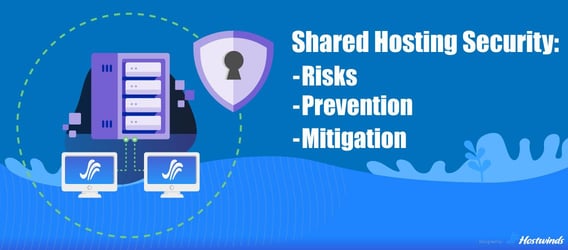Hostwinds Blog
Search results for:

Securing Your Website on a Shared Hosting Plan
by: Hostwinds Team / June 20, 2023
When it comes to hosting your website, shared web hosting is a popular and cost-effective option. However, it also comes with unique security risks that need to be addressed. In this article, we'll explain how to secure your website on a shared web hosting plan.
Understanding the Security Risks of Shared Web Hosting
Shared hosting is a hosting option where multiple websites share the same physical server and its resources. While shared hosting is a cost-effective solution, there is the potential that it could pose higher security risks than other web hosting plans, such as VPS and dedicated servers.
Cross-Site Contamination
One of the biggest security issues with shared hosting is cross-site contamination. This happens when malware or viruses spread from one website to other sites on the same server. This can occur due to vulnerabilities in the server's operating system, web server software, or other software running on the server. Once malware infects one website, it can spread to other websites on the same server, potentially compromising all of them.
Single Point of Failure
Another security issue with shared hosting is a single point of failure. Since multiple websites share the same physical server and its resources, if the server is compromised, all the websites on that server are affected. This can happen due to various reasons such as a security vulnerability in the server software, a misconfiguration, or a hacker exploiting a weak password.
Limited Control
Shared hosting also offers limited control over the server environment. Since multiple websites share the same server, it may not be possible to install certain software or configure the server in a specific way. This can limit the website owner's ability to secure their website and prevent security breaches.
Insecure User Behavior
Insecure user behavior is another security issue with shared hosting. Since multiple users have access to the same server, one user's insecure behavior can affect other users on the same server. For example, if one user has a weak password, it can compromise the security of all the websites on the same server.
Basic Precautions for Shared Hosting
When using a shared hosting plan there are a number of precautions you can take to ensure the security of your site and data.
Keep your software up to date: Keeping your website's software up-to-date is crucial as outdated software can contain security vulnerabilities. Make sure things like your CMS (content management system), plugins, themes, etc. are all up to date with the latest security patches/updates.
Strong passwords and 2FA: Use strong unique passwords for all accounts, including your hosting account, FTP account, and any database accounts. Also consider enabling two-factor authentication (2FA) for an extra layer of security.
Regular backups: Make a point to regularly back up your website and store backups off-site. In the event of an attack you have something to fall back on, reducing the amount of downtime your site may experience.
Limit file permissions: Set appropriate permissions across files and directories to prevent any unauthorized access.
Use SSL/TLS: Secure your site with SSL/TLS encryption to protect sensitive data, such as login credentials or credit card numbers.
Use security plugins and tools: Using security plugins and tools is another way to enhance shared hosting security. Anti-malware software, web application firewalls (WAF), and vulnerability scanners are some useful tools that can help you protect your website from security threats.
Regularly monitor your site: Monitoring your website for security threats is an important part of website security. Security plugins can provide alerts for suspicious activity, while log files can be analyzed for signs of hacking attempts. Setting up alerts and monitoring your website regularly can help you detect and respond to security threats quickly.
What to Do If Your Shared Hosting Account Is Compromised
Even with the best security measures in place, there is always a risk that your shared hosting account may be compromised. If you suspect that your website has been hacked or infected with malware, here are some steps you should take immediately:
Isolate the website: If you suspect that your website has been compromised, take it offline immediately. This will help prevent further damage and keep your visitors safe.
Change all passwords: Change all passwords associated with your website, including your hosting account, CMS, and any other user accounts. Use strong, unique passwords that are difficult to guess.
Scan your website for malware: Use an anti-malware tool to scan your website for malware or viruses. If any are found, remove them immediately.
Restore from a backup: If you have a recent backup of your website, restore it to a clean server. This will help remove any malware or viruses that may have infected your website.
Update all software and plugins: Once your website is restored, make sure to update all software and plugins to their latest versions. This will help prevent future security breaches.
Contact your hosting provider: If you believe that your hosting account has been compromised, contact your hosting provider immediately. They can help you investigate the issue and take steps to prevent future breaches.
Notify your users: If your website collects user data, such as login credentials or personal information, notify your users of the security breach and advise them to change their passwords.
Choose a Secure Shared Web Hosting Provider
Securing your website on a shared web hosting plan not only requires taking basic precautions, like regular monitoring and software updates, and using security plugins and tools, it's also important to choose a secure hosting provider that offers SSL certificates, firewalls, and intrusion detection systems (IDS) as part of their hosting plans.
With a good hosting provider and staying proactive on your website, a shared hosting plan will not only save you a few bucks but keep your site and users safe from any foul play.
Related Articles:
Written by Hostwinds Team / June 20, 2023
